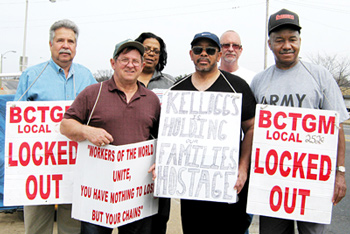

Vol. 78/No. 13 April 7, 2014

|
| Militant/Susan Lamont |
| Workers locked out by Kellogg picket March 15 in Memphis, Tenn. From left: Roger Brown, Harrison Edrington, Christy Small, James Redden, Harold Phillips and Otha Phillips. |
“We’re not only in this for ourselves,” Marvin Rush, who has worked as a mechanic at the plant for seven years, told the Militant. “We’re fighting for all workers. When you’re in a fight, you have to realize that’s what it is — a fight.” Like a growing number of Local 252G members, Rush recently got another job while continuing to be part of the fight.
The locked-out workers recently established the Coalition for Organizational Protection of People and Equal Rights to involve other unions, churches, civil rights groups, community organizations and a few elected officials. The coalition organized a “Unity in the Community” meeting March 15 at the sanitation workers’ union hall. It drew some 75 people, including several dozen locked-out BCTGM members; representatives of the United Auto Workers, Teamsters and United Food and Commercial Workers; the NAACP; Southern Christian Leadership Conference; area ministers; and others.
“Kellogg’s decided to make an example of the Memphis BCTGM members for the rest of their plants in this country and around the world,” Bill Lucy, retired president of the Coalition of Black Trade Unionists, told the gathering. “‘It’s only 220 workers,’ they thought. ‘No one will care.’ But people in Memphis do care about Local 252G.”
“Having more people behind us puts us in a stronger position,” Bubba Harbin, a mechanic who has worked at Kellogg for 38 years, told the Militant after the program. “And getting our fight known is super for us.”
The Congressional Black Caucus and National Football League Players Association recently sent letters to Kellogg’s CEO John Bryant urging an end to the lockout.
A few locked-out union members have lost their homes or cars in recent months, said Local 252G President Kevin Bradshaw. “And many more are threatened with such losses.” Harold Phillips, a maintenance worker with 23 years at the plant, said his daughter might have to leave college.
Eight local members have decided to retire, as a way to restart health insurance, which the company cut off the day they locked out the workers. “Our medical plan at this point is to stay out of the rain,” said Mike James, who works in Kellogg’s warehouse.
The company is operating the plant with scabs and supervisory personnel.
“For a long time, the company tried to project a ‘we are family’ image,” said Harrison Edrington, as he walked the picket line March 15. “What they should say is ‘we are dollars.’”
Contributions can be made payable to “Local 252G Hardship” and sent to BCTGM Local 252G, 3035 Directors Row, Building A #1310, Memphis, TN 38131-0417.
Related articles:
Strikers in Cambodia shoe factory win increase in pay
NJ bakery workers fight firings after immigration audit
Canada truckers stand firm in face of order to end strike
Front page (for this issue) | Home | Text-version home